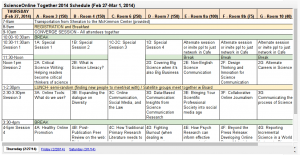 The Non-English Science Communication Session is a discussion session about how science is generated, shared, and communicated online, extending beyond English-speaking audiences. It will be happening this February at ScienceOnline Together 2014 .
The Non-English Science Communication Session is a discussion session about how science is generated, shared, and communicated online, extending beyond English-speaking audiences. It will be happening this February at ScienceOnline Together 2014 .
We will be meeting on Thursday 27th at noon, room 8a, at The McKimmon Center on the campus of the North Carolina State University (NCSU).
NEW! Attending the conference? Please contribute your ideas and let me know if you are joining us for the discussion in this link.
I will be there to lead the discussion as a moderator/facilitator. My function is to serve the attendees by guiding the conversation and helping the room stay as productive as possible, but you and your ideas are what make the sessions worthwhile. For questions or any contingencies you may contact me by phone or email here, also on Twitter using @GonzalezIvanF. In case I am not available please contact Karyn Traphagen: @kTraphagen, (karyn at scienceonline dot com). Check the schedule for last minute changes.
About the session:
English has become the internationally accepted language for research communication; the vast majority of international scientific publications are in English, international collaborations are mostly carried in English, and online scientific content for non-scientists is overwhelmingly in English (Try searching for “Atomic Energy” and then for “Energia Atomica”).
While is fair to think that eventually English proficiency will become one of the multiple skills required by the scientific trade, the global audiences will not become English-literate in the near future. Are we failing to engage a majority of audiences by not going beyond English science communication?
This discussion will be centered in the benefits and challenges of science communication beyond English-speaking audiences, and I will try to maintain the conversation on the subject of what works, what can be improved, and what pathways can be follow to strengthen how science is generated, shared, and communicated globally.
I have enlisted the help of a wonderful group of bilingual volunteers that are the contact person for input and questions in some languages different than English, please contact me if you are interested in joining them.
Use hashtag #ScioLang on Twitter
To start the conversation:
English is the “lingua franca” of science, and that carries a lot of benefits, but also carries the issues of fairness, marginalization, and pro-English bias in scientific publication. With national sciences being strong and growing we are also missing out on important research published only on national languages. Should we have an army of translators bringing the world’s science into English?
Engaging non-English speaking audiences requires more than translation. True engagement requires the use of culturally-relevant examples, an understanding of the literacy levels, and an understanding of the problems and interest of our audience. Are international science communication collaborations a viable instrument to engage non-English-speaking audiences?
Can we have effective Non-English science communication by using a more visual– picture rich– approach to science communication? What about videos? Are symbols really universal?
Help us build a helpful conversation, please bring your input to the Forum: http://together.scienceonline.com/forums/forum/session-discussions/2e-non-english-science-communication/
For more information please check: Beyond English Audiences.




